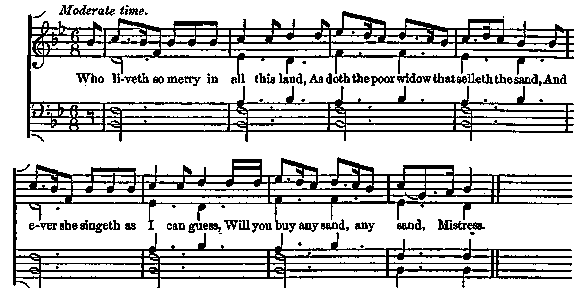Popular Music Of The Olden Time Vol 1
Ancient Songs, Ballads, & Dance Tunes, Sheet Music & Lyrics - online book
| Share page | Visit Us On FB |
|
FROM HENEY VII. TO MARY. |
81 |
||
|
WHO LIVETH SO MERRY IN ALL THIS LAND?
This is also one of the King Henry's Mirth or Freemen's Songs, in Deutero-melia. In the first year of the Registers of the Stationers' Company (1557-58) there is an entry of a license to Mr. John Wallye and Mrs. Toye to print a "Ballette " called " Who lyve bo mery and make such sporte,
As thay that he of the poorest sorte?" These lines will be found in the last verse of the song, and were probably printed ' at the head of it as the title. Ballets were songs of a cheerful character, which being " sung to a ditty may likewise be danced." So the " Merry Ballet of the Hawthorn Tree" (see page 64), was to be sung to the tune of Dargason, which is also mentioned as a dance tune.
The following song will also be found in Wit and Drollery, Jovial Poems, p. 252, and in Wit and Mirth, or Pills to purge Melancholy, vol. i., 1698 and 1707. In Wit and Drollery, as well as in Deuteromelia, the third and fourth lines of each verse are marked to be sung in chorus.
 |
|||
|
|
|||
|
The broom-man maketh his living most sweet, With carrying of brooms from street to street. Chorus.—Who would desire a pleasanter thing
Than all the day long to do nothing but sing ?
The chimney-sweeper all the long day, He singeth and sweepeth the soot away ; Ch.—Yet when he comes home, although he be weary, With his pretty, sweet wife he maketh full merry.
The cobbler he sits cobbling till noon, And cobbles his shoes till they be done ; Ch.—Yet doth he not fear, and so doth say,
For he knows that his work will soon decay.
The merchantman he doth sail on the seas, And lie on the ship-board with little ease ; Ch.—For always he doubts that the rocks are near,— How can he be merry and make good cheer ? |
|||